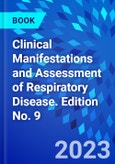A realistic look at treating respiratory diseases! Clinical Manifestations and Assessment of Respiratory Disease, 9th Edition gives you the fundamental knowledge and understanding required to successfully assess and treat patients with respiratory diseases. This foundation helps you learn how to systematically gather relevant clinical data; make an objective evaluation; identify the desired outcome and formulate an assessment; design a safe, appropriate, and effective treatment plan; and document all the steps involved. With this knowledge, you will understand the effectiveness of performing therapies and when to adjust therapy to a desired outcome.
- UNIQUE! Emphasis on clinical scenarios and critical thinking skills prepares you for real-world practice.- UNIQUE! Focus on assessment and Therapist Driven Protocols (TDPs).- UNIQUE! Overview boxes highlight the clinical manifestations for each disease.- Logically organized content is written at a user-friendly, approachable reading level for ease of use and understanding.- Case studies provide realistic examples of the respiratory therapy practitioner’s role in successful patient care.- End-of-chapter self-assessment questions and answer key are available on the companion Evolve website. - NEW! Clinical Connection boxes provide real-world clinical case studies in relevant chapters. - NEW! An updated design and additional tables, boxes, and figures draw attention to key information. - UPDATED! Content includes the latest developments related to SARS and COVID-19. - UPDATED! Information on ventilators, usage, and protocols reflects current practice. - NEW! QR codes in most chapters direct to additional outside content to enhance the chapter, including audio sounds and animations.
Table of Contents
PART I: ASSESSMENT OF CARDIOPULMONARY DISEASESECTION I: Bedside Diagnosis
1.The Patient Interview
2.The Physical Examination
3.The Pathophysiologic Basis for Common Clinical Manifestations
SECTION II: Clinical Data Obtained from Laboratory Tests and Special Procedures - Objective Findings
4.Pulmonary Function Testing
5.Blood Gas Assessment
6.Assessment of Oxygenation
7.Assessment of the Cardiovascular System
8.Radiologic Examination of the Chest
9.Other Important Tests and Procedures
SECTION III: The Therapist-Driven Protocol Program - The Essentials
10.The Therapist-Driven Protocol Program
11.Respiratory Failure and Ventilatory Management Protocols
12.Recording Skills and Intra-Professional Communication
PART II: OBSTRUCTIVE LUNG DISEASE
13.Chronic Obstructive Pulmonary Disease, Chronic Bronchitis, and Emphysema
14.Asthma
15.Cystic Fibrosis
16.Bronchiectasis
PART III: LOSS OF ALVEOLAR VOLUME
17.Atelectasis
PART IV: INFECTIOUS PULMONARY DISEASE
18.Pneumonia, Lung Abscess Formation, and Important Fungal Diseases
19.Tuberculosis
PART V: PULMONARY VASCULAR DISEASE
20.Pulmonary Edema
21.Pulmonary Vascular Disease: Pulmonary Embolism and Pulmonary Hypertension
PART VI: CHEST AND PLEURAL TRAUMA
22.Flail Chest
23.Pneumothorax
PART VII: DISORDERS OF THE PLEURA AND THE CHEST WALL
24.Pleural Effusion and Empyema
25.Kyphoscoliosis
PART VIII: LUNG CANCER
26.Cancer of the Lung
PART IX: ENVIRONMENTAL LUNG DISEASES
27.Interstitial Lung Diseases
PART X: DIFFUSE ALVEOLAR DISEASE
28.Acute Respiratory Distress Syndrome
PART XI: NEURO-RESPIRATORY DISORDERS
29.Guillain-Barre Syndrome
30.Myasthenia Gravis
31.Cardiopulmonary Assessment and Care of Patients with Neuromuscular Disease
PART XII: SLEEP-RELATED BREATHING DISORDERS
32.Sleep Apnea
PART XIII: NEWBORN AND EARLY CHILDHOOD CARDIOPULMONARY DISORDERS
33.Newborn Assessment and Management
34.Pediatric Assessment and Management
35.Meconium Aspiration Syndrome
36.Transient Tachypnea of the Newborn
37.Respiratory Distress Syndrome
38.Pulmonary Air Leak Syndromes
39.Respiratory Syncytial Virus Infection (Bronchiolitis)
40.Bronchopulmonary Dysplasia
41.Congenital Diaphragmatic Hernia
42.Congenital Heart Diseases
43.Croup and Croup-like Syndromes: Laryngotracheobronchitis, Bacterial Tracheitis, and Acute Epiglottitis
PART XIV: OTHER IMPORTANT TOPICS
44.Near Drowning/Wet Drowning
45.Smoke Inhalation, Thermal Lung Injuries, and Carbon Monoxide Intoxication
Appendices
Index








